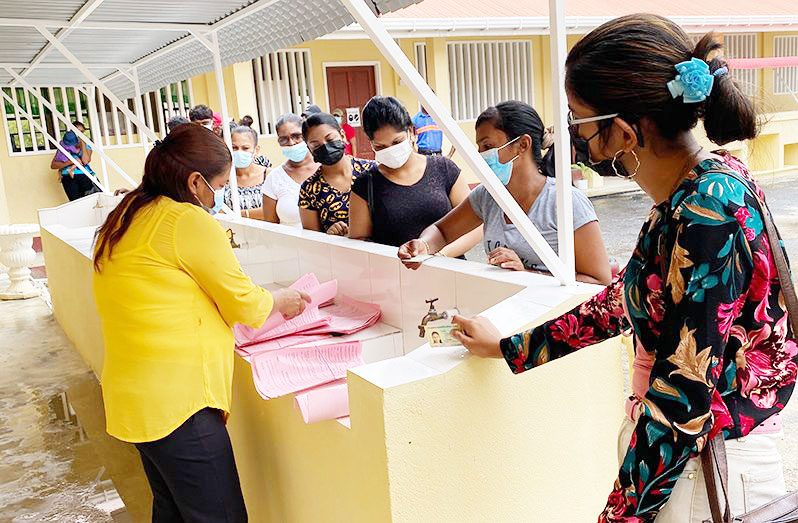OF all the financial incentives given to Guyanese over the past 16 months, government has expended in excess of $7.5 billion on the distribution of the COVID-19 cash grants alone. Once completed, this programme is expected to see each household in Guyana benefiting from a one-off grant valued at $25,000.
In his official New Year’s message to the nation, President Dr. Irfaan Ali indicated that, under the People’s Progressive Party/Civic (PPP/C) administration, each of the 10 Administrative Regions have benefitted from the programme, “…injecting critical liquidity into the economy and providing a cash lifeline to households, so many of which were thrown into distress as a result of the pandemic.”
Admittedly, the COVID-19 Pandemic Assistance Voucher Programme commenced under the former A Partnership for National Unity + Alliance for Change (APNU+AFC), following the March 2, 2020 General and Regional Elections. However, an audit later found that of the 11,000 households, the programme denied more than 9,000 eligible Guyanese from benefitting from the grant. More specifically, it was noted that the programme excluded residents of hinterland, who were given hampers instead of the monies promised.
When the Dr. Ali-led government assumed office in August 2020, the programme was boosted to ensure that each household in Guyana received its entitled grants.
The first phase of the grants commenced in September, with a notable allocation of $4.5 billion. During the distribution exercise, primary households received the grant, while tenants or other families residing at the same address, were issued a ‘pink slip’ for follow-up during the second phase.
Over the past 16 months, the programme benefitted from additional allocations, which also saw approximately 16,000 holders of the pink slips/query forms, being served. Under the PPP/C Government, hinterland residents who were denied the allocation, were given preference.
Earlier in the year, Minister of Local Government and Regional Development, Nigel Dharamlall, explained that the hinterland residents were served first, as they were considered to be more vulnerable.
“It is very expensive to live in those areas and they are not so accessible to services of the government as other regions, and so we thought that it would be best to start paying in those regions first,” Dharamlall was quoted as saying by the government’s Department of Public Information (DPI).
AMERINDIAN COMMUNITIES
Additionally, the government also distributed $1.73 billion to Amerindian communities as part of its one-off COVID-19 relief investment fund, aimed at promoting entrepreneurship and revitalising hinterland economies.
Within the past 16 months, the people of Guyana have benefitted from a host of cash incentives from the government, as a means of cushioning the impact that the global pandemic has had on their livelihoods.
As a matter of fact, a recent report compiled by the World Bank and the United Nations Development Programme (UNDP) showed that households in Guyana have benefitted from more government cash transfers than the vast majority of countries in Latin America and the Caribbean.
The report, which is the results of a regional survey titled: “An Uneven Recovery: the Impact of COVID-19 on Latin America and the Caribbean”, pointed out that close to 80 per cent of Guyanese households have benefitted from either regular or emergency cash transfers during the pandemic.
According to the report, only households in Bolivia and El Salvador have benefitted more than households in Guyana with Haiti at the bottom of the list with around three per cent.
The COVID-19 cash grant programme is just one of the many that Guyanese would have benefitted from in recent months. It was just before the holidays that government announced a special $612 million payout for all healthcare workers across the country.
President Ali hailed the contributions of the healthcare workers, acknowledging the fact that their sacrifices and efforts to fight off the pandemic were deserving of pecuniary recognition.
Added to that, when the May 2021 floods hit, with floodwaters surpassing 15 feet in some areas, the Dr. Ali Government also responded with financial assistance, announcing $7.8 billion payout for every household and farmer affected by the disaster. So far, $7.3 billion worth of cheques have been distributed.
OTHER RELIEFS
The government also restored the education cash grants to parents of school-aged children; it was even extended to include children attending private schools, and according to the President, $3.6 billion have since been distributed to the parents of 192,000 children.
In addition to the one-month tax-free bonus to members of the disciplined services, the government also paid an across-the-board increase of seven per cent to all Central Government employees.
Even further, sugar workers who lost their jobs and were left on the breadline owing to the haphazard closure of four sugar estates, were also given a one-off grant of $250,000.
Moreover, in addition to increasing old-age pensions by over 21 per cent and public assistance by 33 per cent, the government also announced a $2.6 billion relief for vulnerable groups, which included the distribution of $25,000 to all old-age pensioners.
President Ali has assured that as Guyana pursues a prosperous future, Guyanese will not be left behind, and that effective programmes and policies would be put in place to ensure that Guyana is never again, referred to as among the poorest countries of the world. “Never again must we be subjected to insults and contempt… our people must share in the benefits of the wealth that is now Guyana’s – and share in it without fear or favour,” Dr. Ali asserted.
In his New Year’s address, he continued, “It is the right of their birth and a right that has been earned by them and their fore-parents who toiled, sweated and sacrificed to make Guyana their beloved homeland.”



.jpg)










